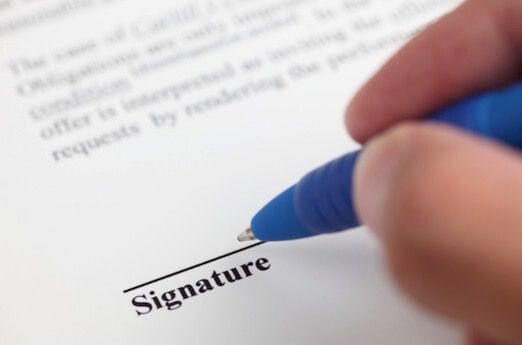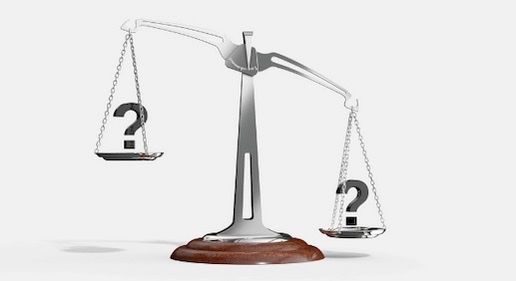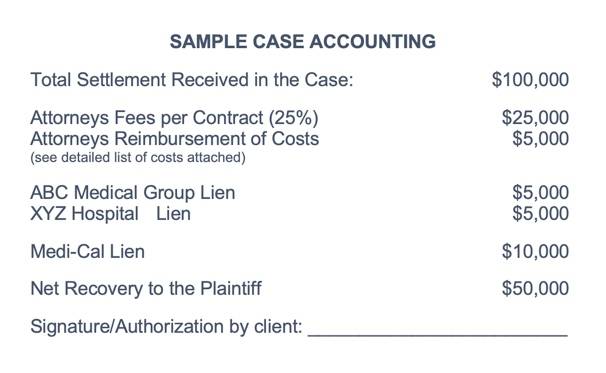
How much should you pay a personal injury lawyer in California?
 By Daniel Amos
By Daniel Amos “How much should I pay my personal injury lawyer?” is a question I hear all the time.
The simple answer is: Pay as little as possible!
But in order to pay as little as possible, you first need to understand how to calculate the lawyer's fees and costs you will be charged by your personal injury lawyer.
The best three ways for you to accurately calculate how much you will pay in lawyer fees in a California personal injury case is by carefully reading and understanding your contingency fee contract, then negotiating your contract, and finally understanding the distribution procedure at the end of your case when you have reached a settlement.
In this article, I will cover all three of these strategies and I'll give you the tools you need to maximize the amount of money you will take home in your personal injury case.
As a personal injury lawyer in California since 1985, I hope to share both my experience and some real-life examples that will help you get the most out of your personal injury case.

The best 3 tips to save $$$ on your lawyers fees
In this article, you’ll learn how to actually calculate the attorney's fees and costs you are going to be charged in your personal injury case. I’m hoping to teach you how to do this before you sign a contingency fee agreement with a lawyer. If you have already hired your lawyer, I think you’ll still find this information helpful in your case and get as much from your case as you can.
You’ll also learn about the different types of "costs and fees" that lawyers charge in personal injury cases in California, and the various types of legal contracts that are associated with personal injury cases. My hope is that by the end of this article you’ll have all the information you need to maximize the recovery in your personal injury case.
As a California lawyer since 1985, who has always specialized in personal injury law, and as the founder of Higher Legal, (LRS#130) a State Bar Certified Lawyer Referral Service, I’ve heard a lot of people complain they were charged too much by their personal injury lawyer. It’s not uncommon to hear people say, “The lawyer got more than I did!”
But what surprises me the most is that these same people actually agreed to pay exactly the amount they were charged. They were upset, after the fact, at how much they had to pay at the end of their case, even though they paid exactly what they agreed to pay when they signed their contract at the beginning of their case. That's because they didn't understand these things before the end of their case.
I want you to be happy at the end of your personal injury case with how much you are charged. So, here are my Best 3 Tips You Need to Know before you hire your personal injury lawyer to make sure you have a great result in your case.

Tip #1: Read Your Contract
Let me start by sharing something I tell everyone who contacts me at Higher Legal. I tell them: “The most important decision you will make in your personal injury case, is the lawyer you decide to hire”
There are many reasons why it’s so important to select the right lawyer. One of the main reasons is that every personal injury lawyer in California uses a different contract. And you’ll discover the contract you sign can dramatically change the amount you are going to pay in both the attorney's fees and in the costs in your case.
During the 25 years I was representing personal injury clients, the firm I worked with changed its own contract several times. There is no such thing as a “typical” or “average” amount that personal injury lawyers charge. The amount varies widely, and the amount charged is not usually based on the lawyer's skill level or success record. Unfortunately, it’s often based on trivial things like where their office is located. That’s why it’s so important for you to educate yourself before you sign a contract with a personal injury lawyer.
In addition to using different contracts, lawyers have different ways to present their contracts to new clients. For example, some personal injury lawyers will meet with their client for the first time at the lawyer's office, and while the client is sitting there, the lawyer will hand the client the contract and ask them to sign it, right then and there! That puts the client in a very awkward situation because it doesn’t give the client enough time to read and review the contract. That’s not how the signing of a contract should happen. Don’t let this happen to you!
Many people are too intimidated to say they’d like to take the contract home and read it first. Don’t be intimidated! In order to make sure you have time to read your contract and fully understand it, be sure to get a hold of your contract in advance. Once you have it, be sure to read it in its entirety. Take notes and write down any and all questions you have so you can ask the lawyer all of your questions before you sign it.

Make sure your contract is in writing
And since you are going to read your contract, be sure all of the provisions and conditions of your contract are in it. For example, your contract should not make reference to a prior conversation you had with the lawyer, like “...this contract incorporates all of the terms we discussed in our phone conversation on 4/12/2021”. That is a bad idea. It’s too difficult to tell “what was discussed” during that phone call, so make sure all the terms and conditions of your agreement are in the actual contract you sign.
The California State Bar requires that any contract or fee agreement that is going to involve fees or costs of more than $1,000 must be in writing. (California State Bar: What to Expect Regarding Fees and Billing) This means virtually every personal injury case requires that the contract is in writing. There are similar requirements in jurisdictions all across the country. The point is that all of the terms of your agreement should be in the writing you are asked to sign.
Get your contract in advance so you can review it
Since the contract you are going to sign is going to be in writing, and because you need to read it, ask that it be sent to you well before you meet with any attorney you are thinking of hiring. In other words, if you have done your homework and researched several lawyers you are considering hiring, ask each of the lawyers to email their contracts to you so you can review the contracts at home. That will give you plenty of time to read the contracts and to write down any questions you have. And you will have questions!
These legal contracts are very complicated and use a lot of “lawyer language” and you have the right to have all of it explained to you in plain English, or in whatever language you are most comfortable with. If your primary language is not English, insist the contract be provided in your native language.

Compare the lawyer's contracts side by side
Once you have contracts emailed to you by the various lawyers you are thinking of hiring, this will also allow you to compare their different contracts side-by-side, including all of the terms and all of the fees and costs charged by each lawyer in their contracts. This is a great way to educate yourself!
If you are using the services of a certified lawyer referral service like Higher Legal to help you find your personal injury lawyer, you’ll be able to ask someone with experience to look it over for you, like we do at Higher Legal. We are always available to review a personal injury contract for you before you hire your lawyer. If you would like me to personally look over your contract before you sign it, feel free to email it to me.
So, to summarize Tip #1: The amount you pay your personal injury lawyer in both attorneys fees and costs is stated right in the contract you sign, so it’s really important that you read the contract and understand what you are signing. It says exactly what you are going to be charged, so there should be no surprises unless you don’t read and understand it.

Tip #2: Negotiate Your Contract With Your Lawyer
After you have read your contract and understand it (and have written down the questions you have about it) the next step is to contact the personal injury lawyer you are thinking of hiring (not their secretary or paralegal) and have a conversation with the lawyer (preferably in person) and negotiate your contract. By that I mean, ask for a better deal than the one stated in the contract. In other words, ask for a change that will put more money in your pocket at the end of the case. This is your best chance to improve your recovery!
For example, if the contract says you will pay the lawyer 40% of the recovery, you might ask the lawyer if they will accept 30% of the recovery. This change could save you a lot of money in attorney fees! This is only one basic example, but it shows there are lots of ways for you to negotiate your contract and get more money out of your case.
In my many years of representing personal injury clients in California, I had many clients ask me to reduce my fees, and I always said yes. Looking back at that time, I am surprised more clients didn't ask me for a fee reduction. Lawyers do it all the time. Especially if they really want your case!
Here are some of the basic components of a personal injury contract you need to understand in order to successfully negotiate your contract.
You need to understand the difference between the "Gross" recovery and the "Net" recovery
There is a difference between paying your attorney a certain percentage of the "gross recovery" vs. the "net recovery". The difference between the “gross” recovery and the “net” recovery is this;
- The gross recovery is the total amount of the recovery in the case before any deductions are made. In other words, it is the total amount your case settled for, it’s the total amount received.
- The net recovery is the amount of money remaining after expenses and deductions are made from the gross recovery. In other words, the net recovery is a smaller amount than the gross recovery. It’s the amount that is left over after certain items have been deducted from the gross recovery. These items include the costs the lawyer paid for filing fees, expert fees, deposition fees, etc.
You need to know if your attorney is going to take his/her attorney fees out of the gross recovery or the net recovery because it makes a big difference in how much you will end up paying in attorneys fees, and in turn, how much money you end up within your recovery.
Negotiating your contract on the issue of whether it calls for attorney fees to be taken from the gross recovery or the net recovery can save you a fortune in attorneys fees.
If the attorney takes their fee out of the gross recovery the attorney gets more money because their fee comes first, right off the top. If the attorney takes their fee out of the net recovery, you wind up with more money and you pay less in attorneys fees. These terms “gross” and “net” are really important in your lawyer fee agreement, so be sure to look for them.
In some cases, like medical malpractice cases in California, lawyers are required by law to take their fees out of the net recovery. This means that in California medical malpractice cases, the attorney’s fees are taken out after case costs are deducted. California Business and Professions Code states, “'Recovered' means the net sum recovered after deducting any disbursements or costs incurred in connection with prosecution or settlement of the claim.”
But in most other personal injury cases, like auto accident cases, attorney’s fees are commonly taken right off the top, before deducting costs. (i.e. from the “gross” recovery)
The point here is that you need to understand what the contract says before you sign it, and you need to be OK with it because it will have a big impact on how much money you end up with at the end of your case. And if you understand these terms and discuss them, or negotiate them, with the attorney you are thinking of hiring, you will make a better decision on who you decide to hire.

Here’s what else you need to know to understand your contingency fee contract
When you hire a personal injury lawyer you are going to sign a written contract that is called a Contingency Fee Contract (or Contingency Fee Agreement). It is quite different from most other lawyer contracts because the amount you pay is based on a percentage of the recovery. In other words, you are going to split some of the recovery with your lawyer, instead of paying them by the hour. Personal injury lawyers don’t take cases on an hourly basis.
Contingency fee contracts can be a really good thing for you for many reasons. It is common for various types of lawyers to charge clients between $300 and $800 an hour, or more, and almost nobody can afford to pay that much money per hour. So a contingency fee contract is a good thing for you, as long as you get a contingency fee contract with favorable terms.
In order to intelligently negotiate your contract, you need to have some familiarity with contingency fee contracts
In a contingency fee contract, you are going to pay your personal injury lawyer a percentage of the recovery in your case. Percentages in personal injury contingency fee contracts can range from a high of 50% or more, down to a low of 20%. Since you are going to be agreeing to pay a certain percentage when you sign the contract, negotiate the percentage before you sign it. As mentioned above, if the contract states you will pay your lawyer a 40% contingency fee, ask the lawyer to accept a 30% contingency fee. The change will save you money on your attorney fees!

What is a “Sliding Scale” Contingency Fee Agreement?
Contingency fees are more complicated than most people think. Most personal injury contingency fee agreements contain what is called a “sliding scale” of fees. This is often misunderstood by people who hire personal injury lawyers. What this means is that the contingency fee contract will contain several different percentages, and it is important for you to understand which one will most likely apply to your case and therefore determine how much you are going to pay.
In contingency fee contracts that have a sliding scale (i.e. multiple percentages) there are specific events (such as the setting of a trial date) and/or certain timelines (such as when the case goes to trial) that will activate when you will have to pay these different percentages.
For example, you might see a contingency fee contract that has 3 different percentages in it, like 25% and 33.3%, and 45% and it’s often difficult to understand which one of these is going to apply to your case. Potentially any one of them could apply, or just one might apply, so you need to understand how they work.
The answer to which percentage will apply in your case depends on what happens in your case. And it can mean extra money in your pocket if you understand how this works. And if you understand how this works, you will have more power to negotiate the best deal regarding the percentages in your contract. This is why it is so important to read and understand your contract!
This is how a “Sliding Scale” contingency fee contract works in the real world
Let me give you an example of a client I met after her case was over, who wished she had read her contract more carefully and negotiated a better deal with her lawyer.
Her contingency fee contract had a sliding scale which included three different percentages of fees, specifically 25% and 33.3%, and 45%. This meant she would be charged a different percent, depending on what happened in her case. Unfortunately, she did not understand what those events were or when they might happen.
She told me that when she met her lawyer she signed the contract with “wishful thinking” and was hoping she would only be charged the 25% fee, not the higher rates of 33.3% or 45% which were also mentioned in her contract. Unfortunately, she didn’t really understand why there were 3 percentages in her contract, or which one would apply to her case.
She thought her case was a “good case” and that it would settle rather quickly, without very much work by the lawyer, so she figured she would only be charged 25%. (bad guess!) Her contingency fee contract stated that the amount she was going to be charged started at 25% when she signed her contract, and it didn’t go up from 25% to 45% until “a trial date was set” in her case, and since her case was brand new, she thought a trial date wasn’t going to be set for possibly a year or more, so she wasn’t worried.
What she didn’t know (and didn’t ask) was that in the jurisdiction where her case would be filed the court “sets a trial date” right at the beginning of the case, as soon as the complaint is filed. As a result, as soon as she signed her contract and hired her lawyer, the lawyer filed her case, so right from the start, she was going to be charged a 45% contingency fee because the court “set the trial date” on the same date that her lawyer filed it. So even if her case was settled a week later, without a lot of work by the lawyer, she was going to be charged 45% of the recovery! In a case worth $100,000, that meant she would pay $45,000 in attorney fees instead of $25,000!
That’s why it’s so important to read and understand your contract, and then to negotiate it before you sign it!

So if your contract has a “sliding scale”, like this example, and contains several different percentages, make sure you understand what event makes the fee go up from one percent to the next. If you don’t like what makes the fees go up from one percent to another percent, negotiate that with your lawyer. The worst the lawyer can say is “No.” And if you don’t ask, you will never receive the reduction.
It is common practice for lawyers to negotiate their fees with clients, so ask for a reduction. And if the lawyer won’t lower the fee, you can either find a new lawyer or sign the contract as is.

Understanding the difference between fees and costs
Every personal injury case has both “fees” and “costs”. You will be paying both fees and costs, so you need to understand the difference.
The fees are the amount you will pay to your lawyer for their work. This is sometimes referred to as attorneys fees or lawyers fees, and it is what you are actually being charged by the lawyer for their work on your case. It’s what I referred to above as the contingency fees. The fees refer to the money you are paying your lawyer for the time and effort they spent on your case.
You might also see something in your contract about your lawyer “sharing” attorney's fees in your case, and this means they are giving some of their fees to another lawyer who helps them work on your case. This normally should not raise the amount of fees you will be charged, it simply means that the amount your lawyer is charging you is being shared with another lawyer. You are not being charged twice.
The costs are the amount the lawyer has paid for out-of-pocket expenses in your case. In other words, when your lawyer agreed to take your case, your lawyer started to spend money on your case for things such as filing the complaint, paying expert witnesses to review your case, for subpoenas and to photocopy records, to make exhibits, to pay court reporters for deposition transcripts, for travel expenses, etc. There are lots of things that lawyers have to pay for to work on your case and to prepare it for trial. The costs in a personal injury case can range from a few thousand dollars to hundreds of thousands of dollars.
You should make sure you know what costs you are going to pay before you sign your contract and hire your lawyer. Your contract will state what costs you have to pay for. For example, I have seen some contracts which state that the lawyer can charge the client for all travel costs, including First Class plane tickets on any flights the lawyer has to take in the case. I personally feel this is excessive, and if something like this is in your contract, you need to discuss it before you sign your contract. Again, be sure to read your contract carefully and see what it says about the costs you will be charged, and discuss it with your lawyer before you sign your contract.

WARNING: Don’t pay your costs upfront!
While we're on the topic of costs, I want to provide a warning about any lawyer who makes you pay the costs in your case upfront. In other words, a lawyer who says they want a $5,000 retainer which they will use to pay the costs in the case, and once the retainer is used up they want you to continue to pay the costs as they are incurred. Don’t do it.
In a typical personal injury case, the lawyer (not the client) pays the costs as the case progresses, and if the case is lost, the lawyer doesn't get his or her money back for the costs. That’s typically how it works in a personal injury case in California. Paying the costs and risking they may be lost is just one of the risks a personal injury lawyer takes when they take a case on a contingency fee basis.
If the lawyer wants you to pay the costs, it might mean the lawyer does not believe in your case, or it might mean the lawyer can’t afford it and doesn't have the financial resources to handle your case. In my opinion, that’s a red flag.
Part of the whole contingency fee process is that the lawyer is taking a risk on you and your case. The lawyer is risking his or her own money in the hope that you win your case. That’s why a personal injury lawyer who works on a contingency fee basis makes so much money on a case. Sometimes cases are lost, and when that happens the lawyer doesn't get paid any fees for all the time spent on the case by both the lawyer and the firm staff, and the lawyer loses all of the costs they put into the case. If your personal injury lawyer wants you to pay the costs upfront in your case, the lawyer probably doesn’t really believe in the case.
When your case is completed you will pay BOTH fees and costs in your case, so be sure you understand the difference between them, and how they are calculated.
So, the summary of Tip #2 is to 'Negotiate' your contract with your personal injury lawyer BEFORE you sign the contract.
You might ask for a big change in the contract, or you might ask for a little change. That’s up to you. I am always surprised at how many people don’t realize they can negotiate the terms of the contingency fee contract with their lawyer. (except in a California medical malpractice case)
Some people are either too intimidated to ask a lawyer for modifications of the contract or they think it's rude to ask for a change. That’s crazy! For goodness sake, your lawyer is a professional negotiator, so negotiate! And it’s a lot easier to ask for these modifications before you have hired your injury lawyer than it will be to ask for changes after you have hired your lawyer, and worse after your case is concluded.
Bottom line, don’t be afraid to talk to your lawyer. A negotiation is just a conversation. It’s where you are asking questions so you will understand your contract, and possibly modify it as well.

Tip #3: Know How Your Money is Going to be Distributed Because it Will Put More Money in Your Pocket at the End of Your Case!
I’ve had people tell me that they read their contract in advance and negotiated a good deal, but they still wound up with less money than their lawyer! How is that possible?
It’s because the last thing you need to know is how the money in your case is going to be distributed once the case is over.
You see, it’s very likely that you and your lawyer are not the only people who are going to receive money from your case. You need to know everyone who is going to receive some of the money and how much they are going to receive. This is where you literally get down to the bottom line!
I have heard horror stories of people who were told by their lawyer that their case was settled for a certain amount, and the client thought (incorrectly), that was the amount they were personally going to receive. That’s not how it works!
When a personal injury case is settled, the amount paid will be distributed to many people to cover all sorts of expenses like the lawyer's fees, the costs your lawyer spent on the case, the medical and other liens, as well as all other expenses involved with your accident and injuries.
So who else will receive money from your case?
Here’s how it typically works. When your case is settled, your personal injury lawyer will prepare an accounting that sets forth where all of the money from the settlement is going. You should have time to read, review, and understand the accounting before you sign and agree to it, and before the distribution of any money happens.
What does an accounting look like?
Let’s take a look at what an actual accounting in a personal injury case looks like. The number at the top of the accounting page will be the total amount received in the case (the ‘gross’ amount of the settlement). Below that number will be a list of every person and entity who is going to get part of that money and how much they are going to receive. At the bottom of the accounting page will be the amount that is left over, which is the amount that you will receive. (that’s your ‘net’ recovery) Under that should be a signature line where you will be asked to authorize the distribution of the amounts shown in the accounting.
Here are some examples of the types of persons or entities that may get some of the money from your settlement:
- Your lawyer will get a percentage of the recovery according to what is stated in your contingency fee contract;
- Your lawyer will deduct all the money spent on costs, such as filing fees, photocopying of records, serving subpoenas, taking depositions, hiring expert witnesses, etc.
- Contractual liens on your case will also be deducted, including those from your health insurance company, including HMO, PPO, EMO, etc. They may be entitled to reimbursement from you for some or all of the medical bills paid to your doctors, hospitals, and other medical care related to the injuries caused in the accident;
- Statutory liens in your case, including things like Workers Compensation Benefits, Medicare, Medicaid, MediCal, and other statutory entities who may have paid for some benefit or care related to your accident.
These are just a few examples, so before you agree to a settlement in your case it is important for you to ask your personal injury lawyer for the names of everyone who is potentially going to take some of the money from your case. When appropriate, such as with medical liens, you should ask your lawyer to negotiate down those amounts as much as possible.
Here is a simple example of what an accounting might look like in a personal injury case:

As you can see in this sample accounting, the amount the case settled for was $100,000 (as shown at the top of the accounting), but the amount actually received by the client was $50,000 (as shown at the bottom of the accounting). This is why it is important for you to discuss liens in your case with your personal injury lawyer. Once you understand who is going to receive money from your case, you will know how much money you will actually receive from your case.
To summarize: These are 3 tips that can help you put as much money as possible from your case into your pocket:
Tip #1. Read your contract before you sign it!
Tip #2. Negotiate your contract before you sign it!
Tip #3. Know the distribution of money before your case is over!
I hope you’ll try using these tips and let me know how it went. You can share your story in the YouTube video that goes with this post. If you’d like to record your comments for a future YouTube post, call and leave me a voice message at 1 (800) 210-2104.
My hope is that these tips will help you negotiate a great deal and save you money on your attorney fees!

I realize there is a lot of information to absorb here, and this is only a very short summary of these very complex legal issues, so if you have any questions, please always feel free to reach out to me at Higher Legal: Tell Me About Your Case
If you need a referral to a great personal injury lawyer, send me a message through the Higher Legal website contact and I will get right back to you.
During my legal career, I worked with some of the best personal injury lawyers in the country who have recovered billions of dollars for injured people. I have represented thousands of people who have been injured in all sorts of accidents, and I have fought their cases in courts across the State of California.
I am a Lifetime Sustaining Member of the largest Trial Lawyer organization in the country which is made up of thousands of lawyers who represent people who have been injured. I have access to a gigantic amount of useful information and I hope to share my knowledge and experience with you through my blogs and YouTube videos.
In 2009 I founded Higher Legal, a California State Bar Certified Lawyer Referral Service (LRS #130) to help serve the community, protect legal consumers, and improve the quality and affordability of legal services to the public.
I need your help to help others!
If you found this information useful I hope you will share this post with your family and friends, and ‘SUBSCRIBE’ to both my blog and YouTube channel. Your support helps grow our community and allows us to help others like you who are looking for reliable legal information and referrals to the best personal injury lawyers in town.
Thanks for reading!